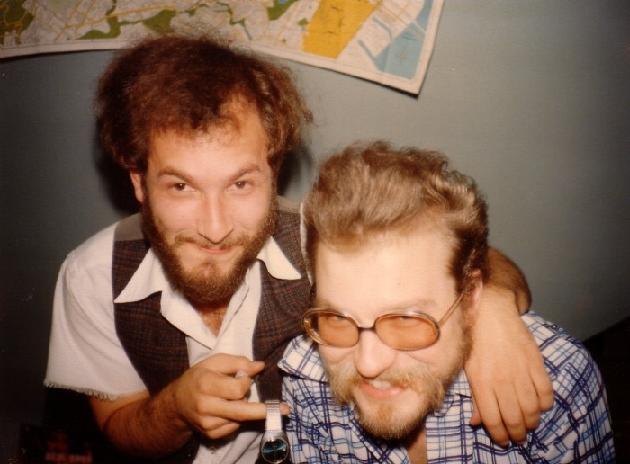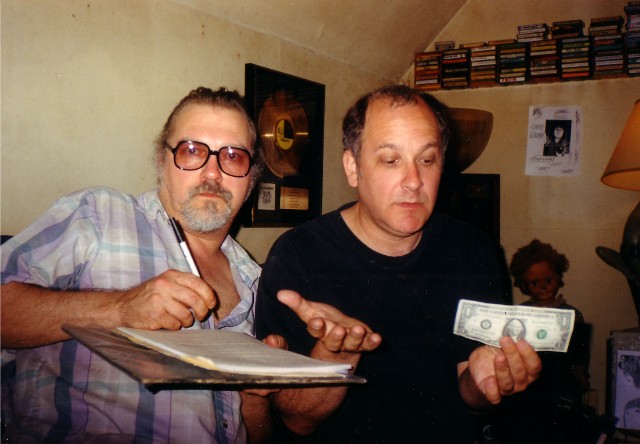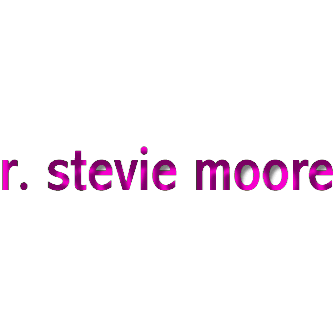THE FUTURE IS WORSE THAN THE PAST
~Fifteenth Album~
Megaphon/Pink Lemon (GER) PINK 008
Issued July 1999


|
Executive Producer: Ralf Friel cover painting � O.Christiansen, "the heavens door II" design & layout by O.Christiansen Recorded mostly at home in Upper Montclair and various other locations, including: "Everyone, But Everyone" and "Play Myself Some Music" recorded at the Dungeon, Maplewood, NJ. eng. by Chris Bolger; "Column 88" rhythm track at WFMU radio; "Baby, Scratch My Back" drums at House of Music, West Orange, NJ, eng. by Glenn Jones; "Disaster in the USA" vocal over WFMU phone lines; "Where We Are Right Now" overdubbed & remixed in UK by Yukio; "Backbone Break" over phone by Roger Ferguson in Nashville; "Flecther Honorama" instruments recorded at home studio Washington DC by Andy; Digital editing and master sequencing by Steve Stein/Sonic Boom Studios, NYC. |



We can all celebrate the fact that R. Stevie Moore remains healthy and crazy. Heart problems a couple of years ago didn't make a dent in his musicianship or in the eccentric spirit that has made him one of the true originals. A staple of the New York/New Jersey underground who became a one-man cottage industry when he started a home-taping phenomenon eons ago, Moore has kept at it, churning out cassettes and LPs by the truckload. He was slow to embrace the digital era, finally breaking down in 1993 and releasing a CD compilation of recordings he'd made over the years. Now, under the guiding hand of music scholar and producer Irwin Chusid, Moore steps into the fore with yet another collection of lo-fi symphonies, including "Everyone, But Everyone," with its echoes of Harry Nilsson, Ben Folds, and Alex Chilton; the synth-spiced "Where We Are Right Now"; the Devo-esque "Academy Fight Song"; and the dreamy "Play Myself Some Music." Unsung by all save a small cult, Moore deserves a wider audience. Perhaps this fine release will help him find it.
Contact: www.rsteviemoore.com.


A spectacular collection from the man who is arguably both the most prolific and least known great American songwriter of the 20th century. As usual, RSM plays all or most of the instruments on most of the tracks; as usual, the tracks range across the entire gamut of pop music from synth to blues to country to alternative to techno to power pop to several genres which have not yet been named, because they don't exist anywhere except on this album; NOT as usual, the tracks hang together and this does not seem at all like a random collection of terrific songs (which it kind of is-- the songs were recorded over a 25 year period (!))-- but like the Last Great Album of the 20th Century, which it also is, unless something amazing happens in the next few minutes. The Billboard review of this album (it was Billboard's "Critic's Choice" for the week of August 28th) invokes everybody from Harry Nilsson to Devo as clear influences on the various songs, which is fair enough; the fact is, RSM has assimilated all of his influences and has surpassed many of them as both an artist and a craftsman.
The album kicks off with a cover of the Talking Heads' "Found A Job," recorded with a distorted, robo-voiced lead vocal and a lyric modified to include references to various Friends of Stevie; propelled along by the effortless virtuosity of the crack rhythm section (Stevie), this is one of those covers (like Detroit's version of the Velvet Underground's "Rock N Roll") where you find yourself saying "So THAT'S what it was supposed to sound like!" It concludes with an impassioned song called "Disaster in the USA" from one Antonio Fiornascente, possibly left (acapella) on Stevie's answering machine, and accompanied not by the major power chords (the musical equivalent of Socialist Realism?) the message would seem to demand, but by a twisting progression of augmented and diminished chords; they make Fiornascente's song moving in a way he probably did not intend, but without making fun of it.
Pick hits among the other 15 songs are the lovely instrumental "For Vini," the Nilsson-like "Once and For All" (Billboard heard Nilsson's influence on "Everyone, But Everyone," but "Once and For All" sounds like a deliberate homage), and the dreamy "Where We Are Right Now" (one of two cuts featuring the great Krystyna Olsiewicz on lead vocal). Also pretty irresistable is the version of Sparks' "Fletcher Honorama," where, for a change of pace, all instruments are played (excellently) by Andy Charneco and Stevie contributes the vocal.
All credit to the producer, the seriously disturbed Irwin Chusid1, responsible (I assume) for the sequencing and the unusally superb sound quality (the album was mastered in Germany). He made a lot of decisions which would appear to be counterintuitive-- including so many covers (6) on an album showcasing a great songwriter, and even starting the set with one of them, including some of Stevie's most uncommercial material ("Oh Baby Baby Baby"), including tunes where other people sing lead. But virtually all of it works. Because the range of material is so wide I don't think anybody will like everything, but surely everyone (or at least everyone reading this) will like MOST of it. Available for $16.00 PP from:
R.Stevie Moore
14 Evelyn Place #4
Bloomfield NJ 07003
____________________________
1 Also aboard as a drummer on some tracks. For some of the comedy stylings of Irwin Chusid, check out Stevie's great "Senior Superlatives" collection, available as a ninety-minute cassette or a double CD.
Aquarius Records (S.F.) new release sheet #79:
MOORE, R.STEVIE "The Future Is Worst Than The Past" (Megaphon) cd
Before things such as "indie-rock" or "DIY" were phenomena of cool, R. Stevie Moore started hometaping his own pop songs over 30 years ago with a naive style that even Rolling Stone magazine recognized, by naming Moore's album "Phonographie" to it's list of the 50 most influential records of all time. With over 1000 (yes over one thousand!) songs, 14 albums, and 250 cassettes, it may be difficult to judge which R. Stevie Moore records would be worth owning.
"The Future Is Worse Than The Past" is a best-of compilation of Moore's work which collects his quirky pop sensibility (which parallels such intentionally naive indie rockers as Calvin Johnson and Mark Robinson) onto a single CD.
Did we mention that he has no car?
|
METROLAND, Albany NY Recordings Rock of Ages R. Stevie Moore The Future Is Worse Than The Past (Megaphon) by David Greenberger Oct 21-27, 1999
THE RECLUSIVE R. STEVIE MOORE HAS ���The first three songs alone demonstrate his breadth �� Moore is part mad scientist and part unabashed romantic. The opening cover of Talking Heads' "Found A Job" and the next song, Moore's own "Misplacement," are both flush with his characteristic cranked and crackling guitars, drum machine, bass and slightly distorted vocals. The slow, expansive third number, "Everyone, But Everyone," smartly breaks from the density of the previous two; throughout the album, Moore's wacky dramatics give way to overt dreaminess. On [i]Future's[/i] 17 songs, he is joined by a number of guests, but this is primarily a solo show, with him playing nearly everything you hear. The prime difference between this and his ongoing home-cassette releases is the presence of a producer. Irwin Chusid brings cohesion to Moore's disparate inclinations, so love and looniness intermingle with grace and ease. --------- |
|
 ���
��� ��1997
��1997



|


|